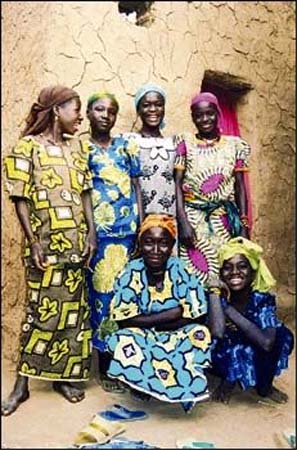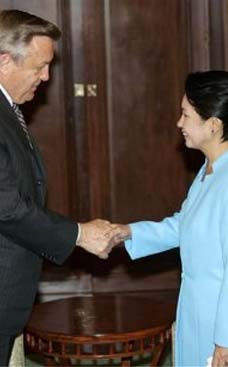2007.06.29: June 29, 2007: Headlines: COS - Niger: Women's Issues: Great Falls Tribune: Cathy Day worked in Niger for three years as an agriculture volunteer and as a volunteer leader with the Peace Corps
Peace Corps Online:
Directory:
Niger:
Peace Corps Niger :
Peace Corps Niger: Newest Stories:
2007.06.29: June 29, 2007: Headlines: COS - Niger: Women's Issues: Great Falls Tribune: Cathy Day worked in Niger for three years as an agriculture volunteer and as a volunteer leader with the Peace Corps
Cathy Day worked in Niger for three years as an agriculture volunteer and as a volunteer leader with the Peace Corps

"I miss Niger. I miss its wide-open landscapes. I understand now how the cowboys felt when the American West was fenced in. A landscape without fences has a wilder, freer feel. I miss knowing that I can walk from village to village and expect a welcome wherever I go. Most of all, I miss the people I know there. People are the center of life in Niger. While their level of poverty is inconceivable here, the deep connections within their communities are also foreign to most modern Americans. New relationships are built quickly, and everyone in my small village knew each other well. They also knew those passing through from nearby villages, villages with populations of as many as two or three thousand people. Everyone is greeted by name. Even a brief greeting involves asking after family, work and health."
Cathy Day worked in Niger for three years as an agriculture volunteer and as a volunteer leader with the Peace Corps
Volunteer misses Niger, especially its people
By CATHY DAY
For the Tribune
Caption: Liba, in blue scarf, in front of her new home after being married. With her are Hajo and the last of the unmarried girls from the group.
Earlier this spring I left Niger. Just in time, because the hot season already was starting. The season of sleeping wrapped in a wet sheet was always difficult for me, the 120-degree, humid afternoons most of all.
Highs were around 100 degrees when I left, and since I am back in Montana, enjoying gorgeous, sunny 70-degree days, you would think I would be nothing but content.
But I miss Niger. I miss its wide-open landscapes. I understand now how the cowboys felt when the American West was fenced in. A landscape without fences has a wilder, freer feel. I miss knowing that I can walk from village to village and expect a welcome wherever I go. Most of all, I miss the people I know there.
People are the center of life in Niger. While their level of poverty is inconceivable here, the deep connections within their communities are also foreign to most modern Americans. New relationships are built quickly, and everyone in my small village knew each other well. They also knew those passing through from nearby villages, villages with populations of as many as two or three thousand people. Everyone is greeted by name. Even a brief greeting involves asking after family, work and health.
People became the center of my life in Niger, too. I knew the faces of everyone in my village, even if I never quite mastered all of the children's names.
One group I worked with was the young, soon-to-be-married girls. Despite the gap in our ages, we were considered natural companions by some of the married women. I am not married, and, in Niger, that is almost unheard of for a woman older than 25. Those rare cases of "older," unmarried women are those who work in government and development organizations in the city — never women who are still living in villages. So, beginning from what I considered a rather funny assumption, I built a relationship with these 12- and 13-year-old girls.
The girls started out as members of an ever-changing group of children who came nightly to the compound I shared with my neighbors. I wanted to temporarily fill in for the village's lack of a school. The children would sit in a circle of 40 or more and I would read stories, teach them to draw letters in the sand and sing "Old McDonald Had a Farm" with them in the Hausa language. After weeks of this pattern, though, I was frustrated — too many children and too many ages for any of them to really learn.
So, soon, just the older girls began to come to my own tiny compound each night, carrying the notebooks and pencils I had bought for them. We worked slowly through the vowels and numbers one through 10.
Hajo, my closest almost-teenage neighbor and also one of my best friends, was most dedicated. She showed up every night, and her infectious laugh alternated with a serious determination to learn her letters. She somehow managed to crack all the other girls up while learning faster than any of them.
We worked by candlelight, sitting on my biggest plastic mat. Thirteen girls came, although rarely all on the same night. A Peace Corps friend gave me a blackboard, and I drew the letters on the painted wood, slowly and carefully showing the girls how to create the shapes.
Later we also met each week to talk about how to improve family health and environmental conditions around the village. The girls were so excited to meet every week and to continue their literacy training. I got the sense it was the first time any of them had felt as though someone had considered them capable of formal education or had cared to single them out from all of their many siblings.
I got to know each of the girls well. That meant that seeing them married when they were still very young girls was difficult, but I was glad that at least the time we had spent together meant that they knew a little more about keeping their children healthy, and they would be more likely to allow their daughters to go to school.
I became close to the girls and others in the village, but everyone became an important part of my community there. Community and interdependence are what make life in Niger livable, even joyful.
Nigeriens often depend on one another for help in times of crisis. More commonly, though, families, friends and communities are connected because they produce food, create entertainment and provide all kinds of labor for one another. In the U.S., where we buy our food without ever knowing who grew it, and where we watch TV, play video games and surf the Internet for entertainment, we seem sometimes to have forgotten the essential role of other people in our lives.
My time with the girls and other friends in the village powerfully reminded me — taught me — that nothing in life is so important as building connections and taking care of the people in your life.
EDITOR'S NOTE: Cathy Day worked in Niger for three years as an agriculture volunteer and as a volunteer leader with the U.S. Peace Corps. She returned to Great Falls in April.
Links to Related Topics (Tags):
Headlines: June, 2007; Peace Corps Niger; Directory of Niger RPCVs; Messages and Announcements for Niger RPCVs; Women's Issues; Peace Corps Library; Peace Corps Directory; Peace Corps Original Sources; Bulletin Board; Peace Corps Headlines
When this story was posted in June 2007, this was on the front page of PCOL:





Peace Corps Online The Independent News Forum serving Returned Peace Corps Volunteers
 | Public diplomacy rests on sound public policy
When President Kennedy spoke of "a long twilight struggle," and challenged the country to "ask not," he signaled that the Cold War was the challenge and framework defining US foreign policy. The current challenge is not a struggle against a totalitarian foe. It is not a battle against an enemy called "Islamofascism." From these false assumptions flow false choices, including the false choice between law enforcement and war. Instead, law enforcement and military force both must be essential instruments, along with diplomacy, including public diplomacy. But public diplomacy rests on policy, and to begin with, the policy must be sound. Read more. |
 | Peace Corps Funnies
A PCV writing home? Our editor hard at work? Take a look at our Peace Corps Funnies and Peace Corps Cartoons and see why Peace Corps Volunteers say that sometimes a touch of levity can be one of the best ways of dealing with frustrations in the field. Read what RPCVs say about the lighter side of life in the Peace Corps and see why irreverent observations can often contain more than a grain of truth. We'll supply the photos. You supply the captions. |
 | PCOL serves half million
PCOL's readership for April exceeded 525,000 visitors - a 50% increase over last year. This year also saw the advent of a new web site: Peace Corps News that together with the Peace Corps Library and History of the Peace Corps serve 17,000 RPCVs, Staff, and Friends of the Peace Corps every day. Thanks for making PCOL your source of news for the Peace Corps community. Read more. |
 | Suspect confesses in murder of PCV
Search parties in the Philippines discovered the body of Peace Corps Volunteer Julia Campbell near Barangay Batad, Banaue town on April 17. Director Tschetter expressed his sorrow at learning the news. “Julia was a proud member of the Peace Corps family, and she contributed greatly to the lives of Filipino citizens in Donsol, Sorsogon, where she served,” he said. Latest: Suspect Juan Duntugan admits to killing Campbell. Leave your thoughts and condolences . |
 | Warren Wiggins: Architect of the Peace Corps
Warren Wiggins, who died at 84 on April 13, became one of the architects of the Peace Corps in 1961 when his paper, "A Towering Task," landed in the lap of Sargent Shriver, just as Shriver was trying to figure out how to turn the Peace Corps into a working federal department. Shriver was electrified by the treatise, which urged the agency to act boldly. Read Mr. Wiggins' obituary and biography, take an opportunity to read the original document that shaped the Peace Corps' mission, and read John Coyne's special issue commemorating "A Towering Task." |
 | Chris Dodd's Vision for the Peace Corps
Senator Chris Dodd (RPCV Dominican Republic) spoke at the ceremony for this year's Shriver Award and elaborated on issues he raised at Ron Tschetter's hearings. Dodd plans to introduce legislation that may include: setting aside a portion of Peace Corps' budget as seed money for demonstration projects and third goal activities (after adjusting the annual budget upward to accommodate the added expense), more volunteer input into Peace Corps operations, removing medical, healthcare and tax impediments that discourage older volunteers, providing more transparency in the medical screening and appeals process, a more comprehensive health safety net for recently-returned volunteers, and authorizing volunteers to accept, under certain circumstances, private donations to support their development projects. He plans to circulate draft legislation for review to members of the Peace Corps community and welcomes RPCV comments. |
 | He served with honor
One year ago, Staff Sgt. Robert J. Paul (RPCV Kenya) carried on an ongoing dialog on this website on the military and the peace corps and his role as a member of a Civil Affairs Team in Iraq and Afghanistan. We have just received a report that Sargeant Paul has been killed by a car bomb in Kabul. Words cannot express our feeling of loss for this tremendous injury to the entire RPCV community. Most of us didn't know him personally but we knew him from his words. Our thoughts go out to his family and friends. He was one of ours and he served with honor. |
 | Peace Corps' Screening and Medical Clearance
The purpose of Peace Corps' screening and medical clearance process is to ensure safe accommodation for applicants and minimize undue risk exposure for volunteers to allow PCVS to complete their service without compromising their entry health status. To further these goals, PCOL has obtained a copy of the Peace Corps Screening Guidelines Manual through the Freedom of Information Act (FOIA) and has posted it in the "Peace Corps Library." Applicants and Medical Professionals (especially those who have already served as volunteers) are urged to review the guidelines and leave their comments and suggestions. Then read the story of one RPCV's journey through medical screening and his suggestions for changes to the process. |
 | History of the Peace Corps
PCOL is proud to announce that Phase One of the "History of the Peace Corps" is now available online. This installment includes over 5,000 pages of primary source documents from the archives of the Peace Corps including every issue of "Peace Corps News," "Peace Corps Times," "Peace Corps Volunteer," "Action Update," and every annual report of the Peace Corps to Congress since 1961. "Ask Not" is an ongoing project. Read how you can help. |
Read the stories and leave your comments.

Some postings on Peace Corps Online are provided to the individual members of this group without permission of the copyright owner for the non-profit purposes of criticism, comment, education, scholarship, and research under the "Fair Use" provisions of U.S. Government copyright laws and they may not be distributed further without permission of the copyright owner. Peace Corps Online does not vouch for the accuracy of the content of the postings, which is the sole responsibility of the copyright holder.
Story Source: Great Falls Tribune
This story has been posted in the following forums: : Headlines; COS - Niger; Women's Issues
PCOL37976
88





















